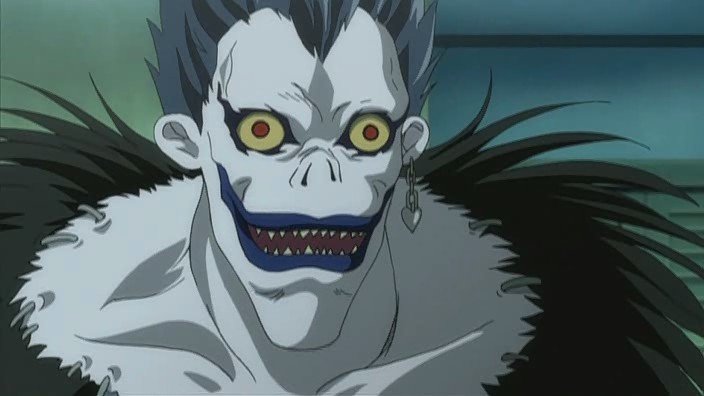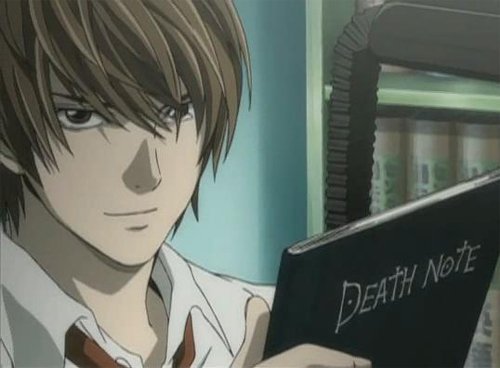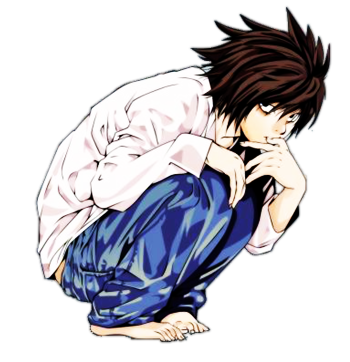Yup, it really is that good.
If it were to put it in novel writing terms, I would invoke Sanderson's First Law:
An author’s ability to solve conflict with magic is DIRECTLY PROPORTIONAL to how well the reader understands said magic.
In other words, the more rules your magic has, the more problems the magic is allowed to solve.
And that's what we got with Death Note, a spectacular anime that I had sadly overlooked until I started subscribing to Netflix.

The entire plot (and what a plot it is) revolves around the appearance of a magic notebook which has the ability to kill anyone whose name is written within its pages. And while this may seem like an avenue of infinite power, the show makes it very clear, from the beginning, that the notebook is bound by stringent rules. There are dozens of these, revealed over the entire course of the show. But each one is revealed long before it becomes a convenient plot device later. And the two biggest rules are revealed at the start.
- Once the person's name is written in the book, they will die (no takebacks).
- You must envision the person's face as you write their name. This keeps people with the same name from being inadvertently killed.
These may seem like simple premises, but the show's characters are intelligent people, and they explore every possible contingency and border case that these two rules can cover. What if you've never seen the person's face and don't know what they look like? What if you've met the person, but they gave you a fake name, and you don't know their real one? What if the person has the same name as a celebrity, and you know that the celebrity's face will pop into your head if you attempt to write the other person's name? What if you rip a page out of the notebook and write people's names on that? All these questions are answered during the first season, and they all play an important part in the story.
The Characters
The central character is a high schooler named Light Yagami, who finds the fallen Notebook and immediately begins to use it.

Light is not a villain by nature. In fact, he has a strong sense of right and wrong and dreams of becoming a detective someday. But his commitment to righteousness does not prevent him from using the Death Note. Instead, it actually makes him more eager to put it to use, thinking he can use it to end all crime and create a world where people don't have to live in fear. This results in him killing dozens of people every day---a fact that does not go unnoticed by the authorities.
Which brings us to the series' primary "antagonist", another teenage boy who is only known by a single letter: "L".

Something of an socially impaired savant, L is a freelance detective who has been secretly helping the world's governments catch the worst criminals on the planet. He has been doing this for many years now, and when so many of Japan's criminals mysteriously start dying, he is brought onto the case.
He does not know about the Death Note's existence, but he quickly discovers, through deductive reasoning, the rules by which the notebook is bound. With some quick-witted detective work and reverse engineering, he learns more and more of his enemy's limitations, and works to turn those against him.
The third most important character is nonhuman. Ryuk is a shinigami (literally "god of death") who is responsible for the Death Note. He is the one who dropped it in the first place, but he is in no hurry to get it back. Instead, he reveals to Light that he is obligated to haunt the notebook's owner until he either dies or forfeits the Death Note to someone else. He occasionally reveals some of the more obscure rules surrounding the notebook, but for the most part, he is just part of the scenery, watching the story play out.
The Plot
As I said above, all the characters in this show are intelligent. And each of the various parties tries to outdo the other by twisting the rules of the Death Note to their advantage. The result is a deadly game of cat and mouse that leaves the viewer guessing where each next turn will lead. Yet never, at any point, does the show cheat. The Death Note may have a lot of plot-advancing rules, but once a rule is revealed, it is never retconned. The plot abides by each rule for the entire length of the show. The story's conflict comes not from the existence of this brand of magic, but how the characters learn to use it, and how far they are willing to go with it.
This is the reason I referenced Sanderson's first law. It suits this series perfectly. The plot is governed by the rules of the magic, and every new point pivots around how those laws are obeyed. This heightens the profile of the show as a fantasy and a psychological thriller.
The Music
I don't often mention the music while reviewing TV shows, but in this case, I must give a nod.
Death Note's score is the perfect accompaniment to the story. It is punctuated by Gregorian chants and other choral music, in accordance with the show's themes of divine retribution and the loss of innocence. The makers of this show were not content to fall back on synthetic music or small ensembles. They put down the good money on their music, and that is a rare (sadly, sadly rare) feat in TV shows, though perhaps more common in Japan than it is in the U.S.
Conclusion
Death Note is delicious. I highly recommend it to anyone who likes anime and rich writing. Its faults are few, and it graciously spaces them out well. The entire first season is available on Netflix (I heard somewhere that all the following seasons are no good, but that's alright, since the first season tells a complete and satisfying story that wraps up nicely).
Thanks for reading.
The first half of Death Note is indeed delicious. I remember telling myself "okay, just one more episode" after each episode lol. Such a great philosophical question too at the core of the show
It was the first show I ever bingewatched on Netflix (well, the first I bingewatched after getting my own account, anyway). I was expecting it to be good (due to all the praise I'd heard about it), but honestly, nothing could have prepared me for how good it was.
Dang, now I'm gonna have to get a Netflix account. Good review, made me want to buy it.
Considering all the content you get, it's not a bad investment.
If anyone is interested, I have also done Netflixing posts on the following serieses:
Death Note is definitely an outstanding show, full of suspense and engagement, plus the depth they went into with everything, I bet it took them an enormous amount of time to write, and revise all of their ideas. It is truly a show not to overlook, very addicting too ;).
I suppose it could have taken a long time to write. And yet, sometimes the most excellent fiction gets written in the shortest amount of time.
As both a writer and a computer programmer, I often hear about getting "in the zone", as it is a phenomenon that is common to both disciplines. Zone-writing results not only in greater quantities of text in a short amount of time, it also produces more organic and engaging stories.
I get the impression that the writers of Death Note were very adept at zone-writing.
There are films as well with real life actors but I think the anime is better... Nice, it also has some interesting theories incorporated into it... Central Limit Theorem... A nice analysis of ego through Light's character beginning to end.
I don't know that a better adaptation could exist than what we find in the anime. I'm not terribly interested in the live action movies.
I absolutely LOVE Death Note. Have for many years now. It's one of the few anime shows I keep going back too. I'm very picky in what I watch and a lot of the newer anime is uninteresting to me. But DN is something else. The character designs, the plot, and the mystery/crime themes keep me entertained and coming back for more. Great article, the only thing is that L isn't a teenager. He is older than Light by a few years.
Light: February 28, 1986 (1989 in anime)
L: October 31, 1979 (1982 in anime)
I would have never guessed.